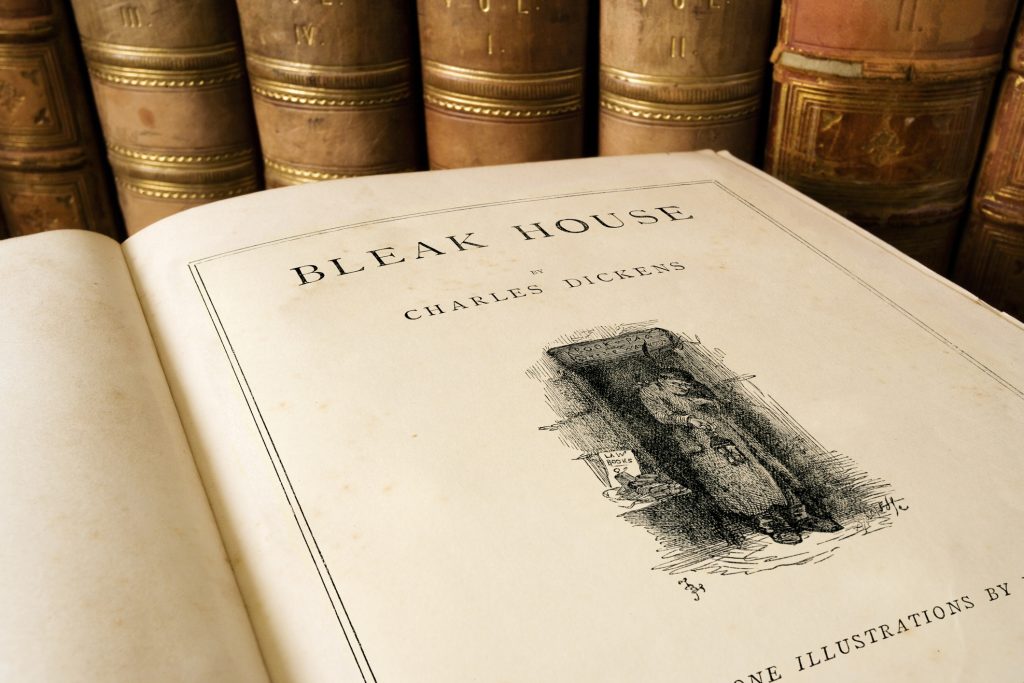Literature and the Law: Dickens
The law features heavily in many of Dickens’ most famous novels, but for the purposes of this article, we’ll be looking at Bleak House and Little Dorrit.

When I arrived at my first Equity lecture and the words ‘Chancery Court’ were used, the first thing I thought was ‘Jarndyce and Jarndyce’. That might just be the English scholar in me, but I suspect not: the old Chancery system has been immortalised, in all its glorious inefficiency, in Dickens’ Bleak House. The case concerns a dispute over an unclear will, and long, laborious descriptions detail the affair has been dragging on for years and years, swallowing up all of the funds that it itself purports to dispute. Dickens writes:
‘Jarndyce and Jarndyce drones on. This scarecrow of a suit has….become so complicated that no man alive knows what it means’.
Dickens’ complete disapprobation with the court system came from his own bitter experience: he worked as a court reporter as a young adult, and saw his own father imprisoned for debt in the famous Marshalsea prison when he was a child. Moreover, he himself sued for unauthorised dissemination of A Christmas Carol, finding (classically, as might be the case today in the absence of legal aid) that his legal fees far exceeded any damages he was awarded.
Jarndyce and Jarndyce finds its parallel in the ‘circumlocution office’ in Little Dorrit. Essentially, it is a fictional government office. It is memorably immortalised in the BBC adaptation through an upwards shot which has always stuck in my mind, perhaps because it is so visually striking. The camera pans up from ground level to show a winding spiral staircase, covered, in its every inch, with piles and piles of papers, each of uniform colour, each indistinguishable from the other. It pans back down to reveal a couple of suit-clad workers, perched artfully at different points of the staircase, amongst the papers. Mr Clenham, one of the principal characters, has come to the office seeking documents concerning his mother’s estate: the shot itself makes it immediately clear that he will not find them.

The book goes into more colourful detail about the vagaries of the Office: but what is arguably most amusing and telling is the name itself. ‘circumlocution’ means to speak in a ‘roundabout or indirect way’ by using ‘several words instead of one, or many instead of few’. The term encapsulates what so many (Dickens clearly included) think about so-called ‘legal jargon’: it ambles along, producing unnecessary semantic complication. Its roundabout lexicon is quite literally, physically embodied by the winding staircase with its excess of paper, in quite a clever, subtle manner.
There is also an interesting reference point to Marshalsea, the debtor’s prison where Dickens saw his own father relegated. Little Dorrit (Amy)’s father languishes away for tens upon tens of years there, earning the title ‘father of the Marshalsea’ for his residential longevity, before an unexpected windfall comes in the way of an inheritance, and he is released to a life of riches. The acquisition of such a windfall involves Mr Clenham’s painstaking attempts to navigate the godforsaken circumlocution office. The very fact that he is in there for so long, that his monetary entitlement was buried in that snowy mass of legal documents, is a condemnation of the system itself.
We can learn many things from Dickens: one of which is the famed inefficiency of the 19th century legal system. Lets hope we have made some progress since!

If you’d like to read more on this topic, take a look at the excellent blog ‘Musings, Memories and Miscellanea’ by the late Sir Henry Brooke. He penned a five-piece series on Dickens, including one dedicated to Bleak House and the Court of Chancery, and another on Little Dorrit and the use of prison in debt recovery.
Iona Makin is a current GDL student, and recent (2023) BA English graduate of Cambridge University. She is particularly interested in criminal law and personal injury. She loves long distance running and cross country, and reading long classical novels and poetry. She is also a (converted) fan of Classical Hollywood, and interested in film theory and visual culture. She is a member of the 2023-24 Lawbore journalist team.
